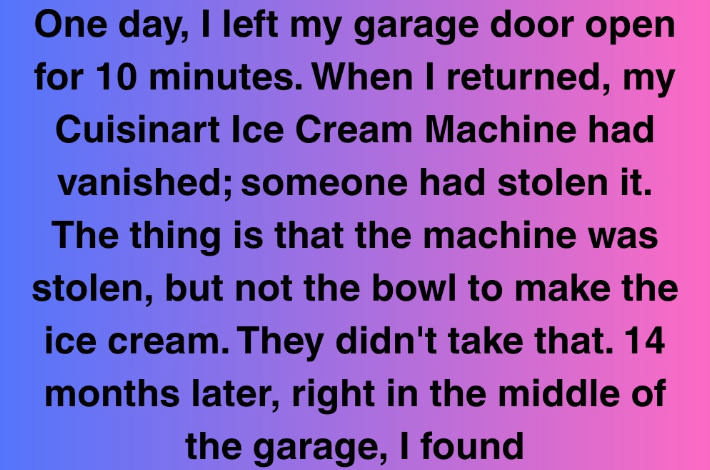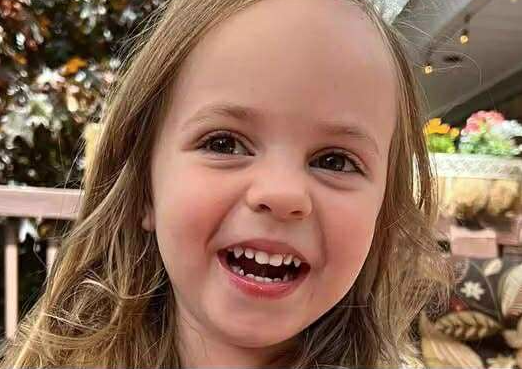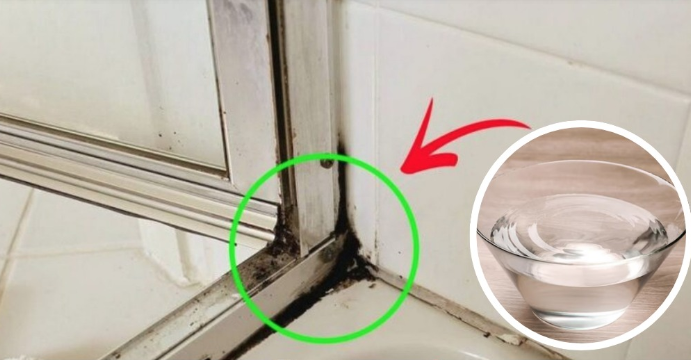One afternoon, I left my garage door open for a brief ten minutes. When I returned, my Cuisinart Ice Cream Machine was gone—stolen. Oddly, the thief left the bowl behind, the one needed to churn the ice cream. They took the machine but not that essential piece. Fourteen months later, I walked into the garage and found the machine sitting in the center, sparkling clean, plugged in, and humming quietly.
I stood there, keys dangling in my hand, wondering if I’d slipped into a dream. The machine wasn’t only back—it was running. A sticky note was attached to its side, bearing four simple words: “Thank you. I’m sorry.”
That was all. No signature, no further details. Nothing else in the garage had been disturbed. I knew it was my machine—the faint scratch on the side, from when I’d accidentally dropped a spoon into it while making pistachio gelato, confirmed it.
At first, I suspected a prank, perhaps a neighbor with an odd sense of humor. But no one in the neighborhood mentioned anything. And what kind of prank involves holding onto an ice cream machine for over a year, only to return it in perfect condition with an apologetic note?
I didn’t tell my family right away. Instead, I switched off the machine, unplugged it, and carried it back into the house, holding it carefully, as if it carried a delicate secret. It still worked perfectly.
That night, sleep eluded me. I kept replaying the strange timing, the machine’s soft hum, as if it wanted to share a story. I scrolled through the neighborhood app, searching for any hint of an explanation. I found none.
Then, a memory surfaced from the previous week. A lanky teenager had knocked on my door, selling candy bars for a supposed school trip. He had no flyer and avoided eye contact. I had no cash, so I turned him away, but I’d noticed something in his expression—a hesitation, as if he wanted to speak but held back.
The next day, I deliberately left the garage door open again. I sat on the porch with a book, watching discreetly. Nothing happened.
Three days later, a second note appeared in my mailbox, written on a torn piece of notebook paper: “She died last week. I didn’t know who else to tell.”
No name, no address. The words hit me hard, like a weight settling in my chest. I knew it had to be connected.
I started asking questions, carefully. At the corner market, I mentioned the candy bar kid to Farid, the clerk who seemed to know every teenager in the area. He frowned and said, “Tall kid? Always in that oversized Lakers jacket?”
I nodded.
“That’s D’von. His grandma lived over on Hadley. Kind woman. He’s had a tough life—bouncing between group homes, I think. But he’s always polite.”
I hadn’t realized anyone still lived in that old mustard-colored house on Hadley. I passed it daily on my walks, but its curtains were always closed.
That evening, I walked by the house. Wilted flowers sat on the porch, and a faded condolence card was tucked into the doorframe.
The pieces fell into place. D’von had taken my ice cream machine, maybe on a whim or out of need. Perhaps he and his grandma had used it, a small spark of joy in their lives. Then, after she passed, he returned it—clean, functional, with an apology.
I felt foolish for ever being upset about the theft. The machine had been a gift from my sister after my divorce, a gesture to lift my spirits. Its loss had felt like a small betrayal of that kindness. But now, the story felt different, as if the machine had served a purpose for someone else in their time of struggle.
That night, I churned a batch of vanilla bean ice cream, taking my time, treating the process like a quiet ritual.
Then, I placed a small container of it on the Hadley house’s front step, along with a note: “For D’von. Come by if you ever want to talk.”
He didn’t show up the next day or the one after, but the container disappeared.
Two weeks later, a knock came at sunset. I opened the door to find D’von, taller than I remembered, wearing that same Lakers jacket. He looked uneasy.
“I didn’t know it was yours,” he said softly. “I wasn’t trying to steal anything. I saw it, and… she kept talking about the old days, when we’d go to Dairy Queen.”
I stayed quiet, opened the door wider, and gestured for him to come inside.
We sat in the kitchen, eating bowls of strawberry ice cream topped with fresh mint. He told me about his grandma, Yolanda—a former teacher who loved puzzles and old gospel records. He spoke of how cancer took her quickly, how social workers came afterward, and how he didn’t know where he’d end up next.
“She told me to bring it back before she passed,” he said. “Said it wasn’t ours, that keeping it wasn’t right.”
“She raised you well,” I said. He looked like he might cry but held it together.
Without thinking, I said, “You can come by anytime. My Tuesdays are pretty quiet.”
He gave a small laugh. “You mean that?”
“Absolutely,” I said. “You bring the hunger. I’ll bring the ice cream.”
That’s how it began. Every Tuesday, D’von showed up—sometimes alone, sometimes with a friend, sometimes with stories, always hungry.
I taught him how to make mango sorbet and espresso affogato. He showed me how to navigate TikTok without embarrassing myself.
One Tuesday, he arrived with a flyer for a community scholarship program for culinary training. “I don’t know,” he said, hesitant. “It feels like a lot.”
“You made cinnamon fig ice cream last week,” I said. “If you can do that, you can handle this.”
We filled out the application together. He was accepted.
On the day he moved into student housing, he handed me a towel-wrapped bundle. Inside was his grandma’s handwritten recipe book.
“She wanted you to have it,” he said. “Said people like you don’t come around often.”
I hugged him, holding on a moment longer than I planned.
Three years have passed. D’von now works at a downtown café. He calls when he’s stressed and sends me photos of every new ice cream flavor he creates.
Last Christmas, I received a card from him: “Thanks for leaving the door open. Twice.”
I didn’t cry, but I made a fresh batch of pistachio gelato.
Someone took my ice cream machine once. In return, I gained a friend—a true one. It showed me that sometimes, people take things not out of malice, but out of pain. And if you’re patient and offer a little kindness, life can return something far greater.
Share this story if you believe second chances arrive in unexpected ways. And maybe, every now and then, leave your door open—you never know what might find its way back.




